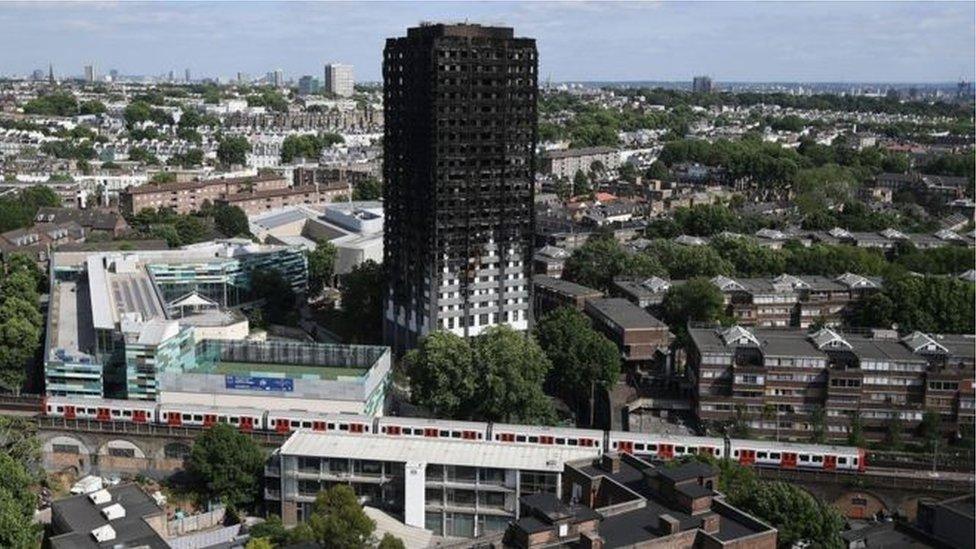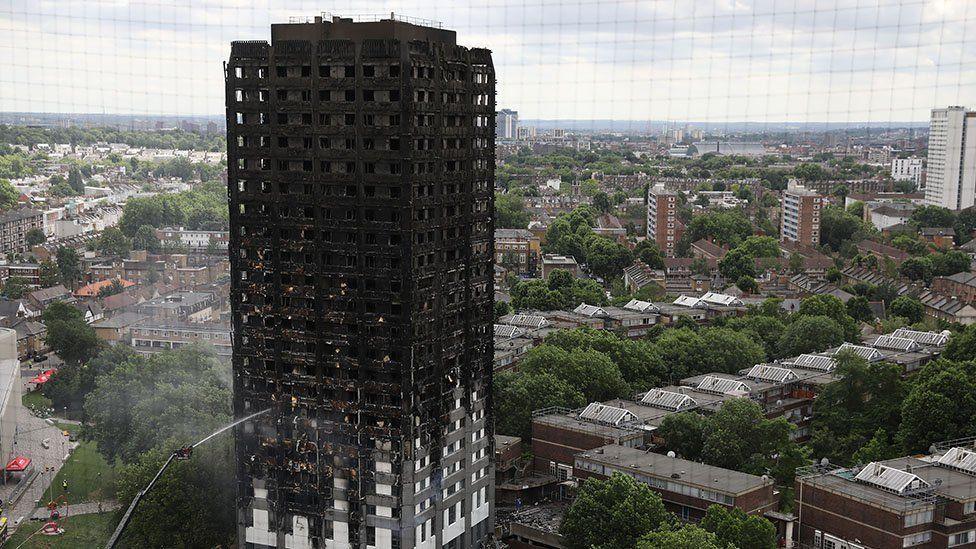Glasgow high-rise cladding information 'not sufficiently clear'
- Published

Checks of buildings in Scotland have been carried out in the wake of the Grenfell Tower fire in London
Information from Glasgow City Council about the type of cladding used on private high rise blocks in the city is "not sufficiently clear", the Scottish government has said.
MSPs were told on Wednesday that combustible cladding had been found on some residential buildings in the city.
The council said it had informed government ministers on 8 September .
However, ministers say more work is needed to determine the type of cladding and the extent of its use.
Housing Minister Kevin Stewart has written to Bob Doris, the convener of Holyrood's local government and communities committee.
Councils across Scotland have been checking buildings in the wake of the fatal Grenfell Tower fire in London.
The committee was told that Glasgow City Council had discovered that aluminium composite material (ACM) had been used at a number of private residential properties in the city.
'Public reassurance'
Raymond Barlow, assistant head of planning and building standards at the council, said information had come to light "in the last couple of weeks".
He said this had been passed on to a ministerial working group.
However, Mr Stewart said the information provided by Mr Barlow on 8 September had "not been sufficiently clear to be able to provide the necessary level of public reassurance".
"This was especially important as depending on the type of ACM cladding, the extent of its use and how it has been installed as part of a cladding system there might be no cause for concern," he said in his letter to Mr Doris.
Mr Stewart said these concerns had been highlighted in another letter to the council, and additional support had been offered to help scrutinise that information.
"Glasgow City Council accepted the Scottish government's offer of assistance on 20 September," he said.
"We will therefore now work with Glasgow City Council to fully investigate and scrutinise the information they have shared so that they can reassure the owners and occupants of private high rise domestic buildings that they are safe."
Glasgow City Council leader Susan Aitken also wrote to Mr Doris to provide assurances.
She said while liaising with Scottish government colleagues it became clear that the information was "not yet a complete picture".
"For this reason the information was not made public," she said.
She confirmed the council would work with the Scottish government to provide the additional information by the end of next week.
Any residents in affected buildings would then be informed by letter, she said.
Safety 'paramount'
Scottish Labour secured an urgent question at the Scottish Parliament on Thursday afternoon.
The party's housing spokeswoman Pauline McNeill asked Communities Minister Angela Constance what action the Scottish government took after receiving the information about the flats.
This was the first time an urgent question had been asked in the Scottish Parliament, following recommendations made by the Commission for Parliamentary Reform.
Ms McNeill said: "The failure to notify and reassure residents before this was made public and reassure their safety was a monumental error and illustrates and unacceptable level of complacency."
She also asked if the Scottish Fire and Rescue Service had now been fully briefed.
Ms Constance said information had not been clear enough to advise residents. She added it was still to be determined whether the 57 buildings highlighted in the report were all domestic properties.
She said: "It's also important to note that the Scottish Fire and Rescue Service sit on the ministerial working group and, like ministers, were aware of the information and the incompleteness of the information that Glasgow had supplied."
Denise Christie, of the Fire Brigades Union, had voiced concerns about the way information had been passed on.
She told BBC Radio's Good Morning Scotland programme that the fire service needed to know where the risks were within their local areas.
"The Fire Brigades Union are concerned that Glasgow City Council knew about it, but their priority wasn't to inform the residents or the Scottish Fire and Rescue Service," she said.
- Published20 September 2017
